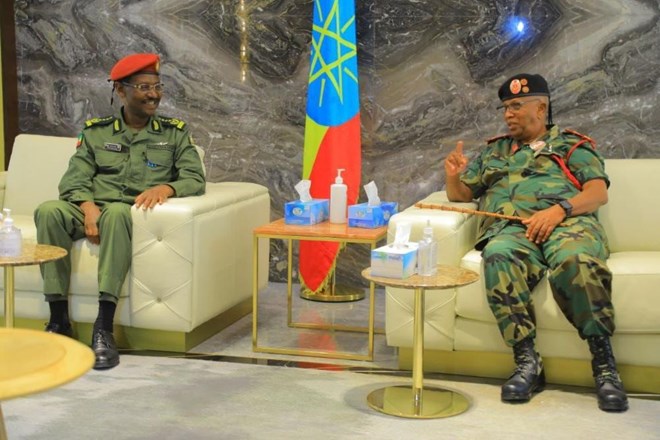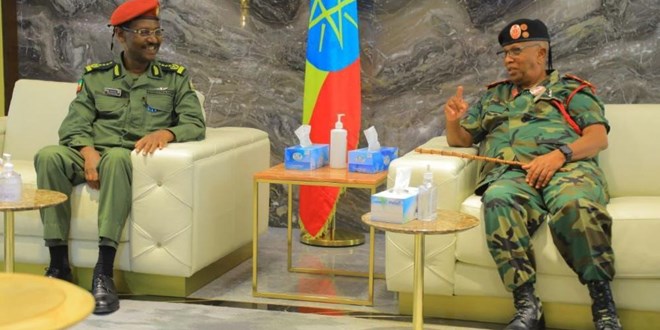[ad_1]

Tuesday January 9, 2024

Field Marshal Birhanu Jula (L) , Chief of Staff of the Ethiopian National Defense Force, meets with Major General Nuh Ismail Tani (R), Chief of Staff of Somaliland, in Addis Ababa on January 8, 2024. (Credit: ENA)
Mogadishu (HOL) – In a provocative move that has escalated regional tensions, Somaliland’s military delegation, led by Chief of Staff Major General Nuh Ismail Tani, met with his counterpart, Field Marshal Birhanu Jula, at the Ethiopian National Defense Force (ENDF) headquarters in Addis Ababa. The ENDF reported that the discussions focused on military cooperation.
This meeting follows a controversial agreement signed last week between both governments, granting Ethiopia access to a 20-kilometer stretch of the Red Sea coastline leased by Somaliland for 50 years. In return, the self-declared Republic of Somaliland is set to receive a stake in Ethiopian Airlines, Ethiopia’s prominent national carrier, and anticipates Ethiopia’s recognition of its independence.
Somalia has promised to defend its territory by “any legal means” .
The deal is seen as pivotal inside Ethiopia, the second-most populous country in Africa and landlocked, providing a strategic alternative advantage amidst its complicated relationships with coastal neighbours Eritrea and Djibouti.
Within Somaliland, the agreement has sparked political turmoil. These military discussions occurred just a day after Somaliland’s Defense Minister, Abdiqani Mohamoud Ateye, resigned in protest. Ateye publicly rebuked Somaliland President Muse Bihi Abdi for excluding the council of ministers from the port deal negotiations with Ethiopia, emphasizing their discovery of the agreement via the media. Ateye’s resignation, who is from the Awdal region of Somaliland, coincides with reports suggesting Ethiopia’s plans to set up a military base in the coastal town of Lughaya in northwestern Awdal.
Meanwhile, Somalia’s President Hassan Sheikh Mohamud made an impromptu visit to Asmara, Eritrea, on Monday for a two-day working visit, suggesting a regional realignment may be underway.
Ethiopia and Eritrea, who made peace in 2018, also face renewed tensions over the strategic Assab port, fueling fears of renewed conflict.
Ethiopian Prime Minister Abiy Ahmed, who won the Nobel Peace Prize for brokering the peace deal, has recently sought access to the Assab port. This move is causing unease in the region, given Ethiopia’s history of using the port until it was cut off following their border war in 1998.
Eritrean officials have criticized Abiy’s approach, reiterating their commitment to national sovereignty. Despite Ethiopia’s MoU with Somaliland, the situation remains tense, with further potential implications for regional stability.
The maritime agreement has led to speculation about the possible impact on the 2018 tripartite treaty involving Ethiopia, Somalia, and Eritrea, though details of this agreement also remain undisclosed.
In July 2012, Somali President Hassan Sheikh Mohamud and Eritrean President Isaias Afwerki signed a memorandum to enhance bilateral relations. This agreement aims to deepen political, economic, and defense cooperation between the two nations, with a focus on trade, investment, and regional stability in the Horn of Africa.
Somalia has condemned the agreement as a breach of Somalia’s sovereignty and territorial integrity. This stance is echoed by major international blocs, including the European Union, African Union, and Arab League, urging Ethiopia to reconsider its decision.
Djibouti, currently leading the regional grouping IGAD, expressed concern and said, “The republic of Djibouti affirms its adherence to the respect of the territorial integrity and sovereignty of all members of IGAD states.”
The human impact of this geopolitical maneuvering is profound. In Mogadishu and Buroa, public protests erupted, signalling widespread apprehension about potential territorial breaches. In Ethiopia, the agreement is perceived as a possible diversion from internal turmoil, offering a chance for Prime Minister Abiy to regain domestic support following its recent default on a $33 million international bond interest payment.
Journalistic freedom has also come under the lens following this deal. The arrest of three journalists in Somaliland during a live debate on the pact drew international criticism and concerns about press freedom.
[ad_2]
